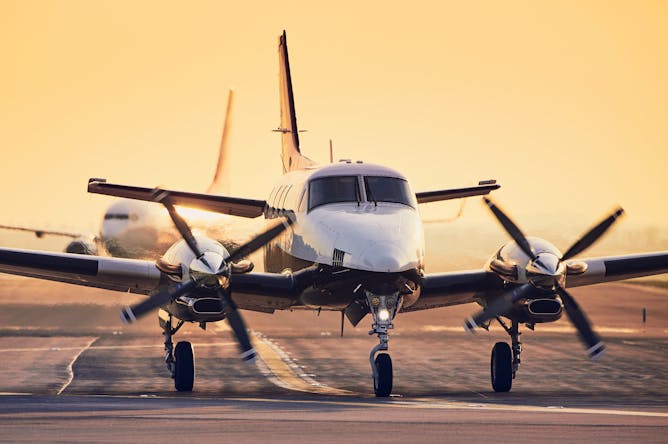|
|
|
|
Two weeks ago, Ukrainian forces pulled off a major counteroffensive against the larger Russian army. One of our most-read stories last week explains some of the military strategy Ukraine used to regain 2,000 square miles of land. One tactic: adapting the age-old use of deception to the modern information age. Benjamin Jensen of American University explains that the Ukrainian’s strategy served a pressing political need by stopping the conduct of staged referendums on support for Russia in the Kharkiv region – although the voting went ahead in other parts of the country on Friday.
Jensen concludes, “Moscow can still opt for a large-scale mobilization and continue the war until either Russian elites or its citizens turn on Putin and his inner circle.”
Have you ever wondered why most airplanes still run on jet fuel, and not electric power? Aerospace engineer Gökçin Çınar, an assistant professor at the University of Michigan, answered our questions about how hybrid electric airplanes work and how soon we might be able to fly with less concern about the environmental costs.
Next week, we’ll bring you stories about how religion is shaping the Brazilian presidential election, why so many Nobel Prize winners are polymaths and the use of deep brain stimulation for treatment of OCD.
Thanks for reading – and if you haven’t tried our news quiz yet, it’s good fun. I got 7/8 right this week. Can you do better?
Also, we are providing five of our most-read articles in an e-book format. Click here to try it.
|

|
Emily Costello
Managing Editor
|
|
Readers' picks
|

Astronomers think the most likely place to find life in the galaxy is on super-Earths, like Kepler-69c, seen in this artist’s rendering.
NASA Ames/JPL-CalTech
Chris Impey, University of Arizona
Newly discovered super-Earths add to the list of planets around other stars that offer the best chance of finding life. An astronomer explains what makes these super-Earths such excellent candidates.
|
|
|
-
Kathleen Frydl, Johns Hopkins University
The United States came in 41st worldwide on the UN’s 2022 sustainable development index, down nine spots from last year. A political historian explains the country’s dismal scores.
-
Cagri Kilic, West Virginia University
Discarded pieces of landing gear, crashed spacecraft and wear and tear have produced a lot of debris that is now scattered around the Martian surface.
-
Ivan Erill, University of Maryland, Baltimore County
Phages, or viruses that infect bacteria, can lie dormant within chromosomes until they’re triggered to replicate and burst out of their hosts.
-
Benjamin Jensen, American University School of International Service
A military strategist breaks down how a smaller Ukrainian army has successfully taken back swaths of land from the Russians in the country’s northeast.
|
|
Editors' picks
|

Small planes are easier to electrify, but larger ones aren’t far behind.
Chalabala/istock via Getty Images
Gökçin Çınar, University of Michigan
Air Canada and United Airlines both have orders for hybrid electric 30-seaters. An aerospace engineer explains where electrification, hydrogen and sustainable aviation fuels are headed.
|
|
|
-
Greta de Jong, University of Nevada, Reno
In the civil rights era, ‘Reverse Freedom Rides’ were more than just a political stunt. They were part of a systematic effort to deprive Black Americans of their livelihoods and force them out.
-
Carlos A. Suárez Carrasquillo, University of Florida; Fernando Tormos-Aponte, University of Pittsburgh
Hurricane Fiona will set back efforts to restore Puerto Rico that date back five years to Hurricane Maria. Two scholars explain how the island’s weak institutions worsen the impacts of disasters.
-
Shuang-Ye Wu, University of Dayton
Millions of people around the world suffered through long-lasting heat waves and deadly flash flooding in the summer of 2022. A climate scientist explains the rising risks.
-
Deepasri Prasad, Dartmouth College; Wilma Bainbridge, University of Chicago
People are puzzled when they learn they share the same false memories with others. That’s partly because they assume that what they remember and forget ought to be based only on personal experience.
|
|
News Quiz 🧠
|
-
Quizmaster, The Conversation
This week: questions on Medicaid, electric-powered planes and Mars trash.
Download the new e-book edition
We are providing a magazine version of five stories in this newsletter to read on a tablet, e-reader or on paper. Try it out and reply to this email to tell us what you think.
|
|
|
Like this newsletter? You might be interested in our other weekly emails: About The Conversation: We're a nonprofit news organization dedicated to helping academic experts share ideas with the public. We can give away our articles thanks to the help of foundations, universities and readers like you. Donate now to support research-based journalism
|
| |
| |
| |
| |
|
|
|
|
|
|
|